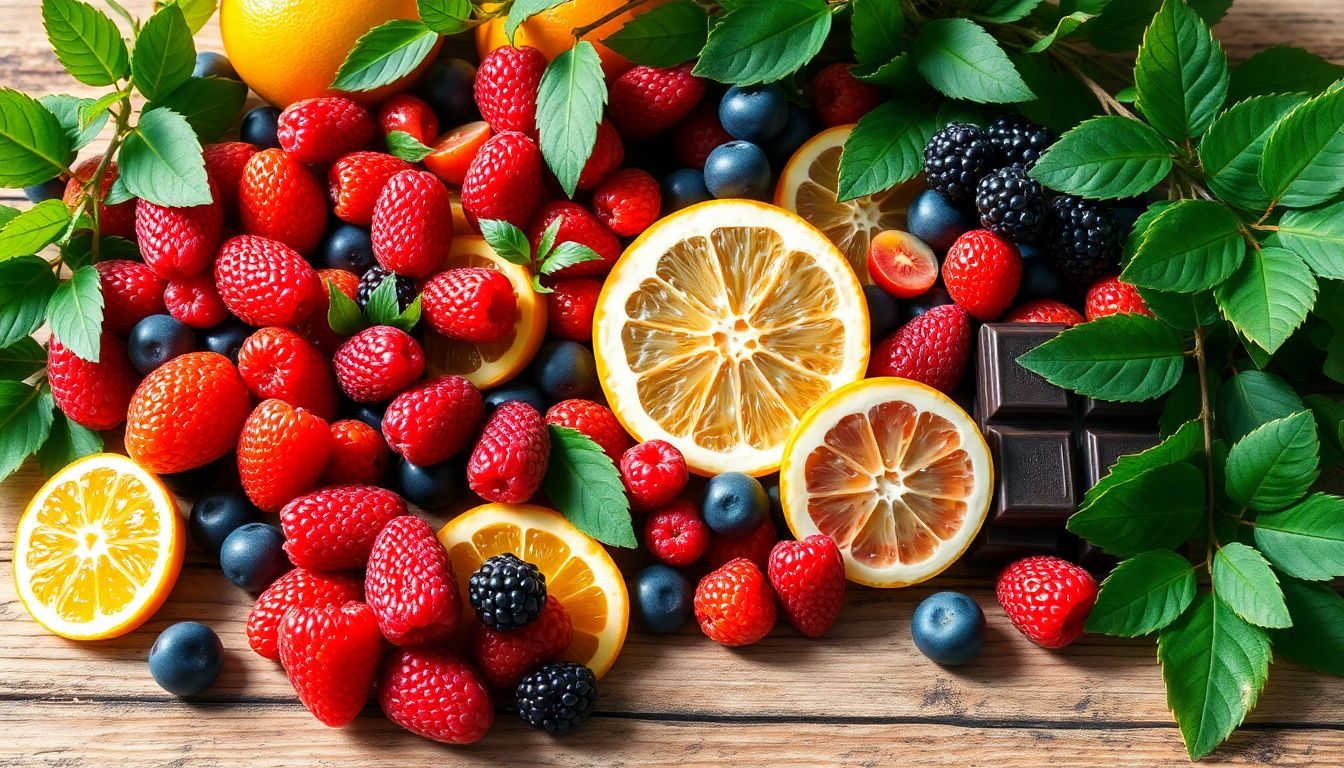Many people worry about memory loss or trouble thinking as they age. Eating foods high in flavonoids might help protect brain health and reduce cognitive decline. This blog will show you how these natural compounds can boost your memory and lower the risk of diseases like Alzheimer’s.
Thank you for reading this post, don't forget to subscribe!Keep reading to learn easy ways to add flavonoid-rich foods into your meals!
Key Takeaways
- Flavonoids improve brain health by boosting memory, learning, and cognitive functions. Foods like blueberries, apples, and green tea are rich in these compounds.
- Regular intake of flavonoid-rich foods can slow age-related cognitive decline and reduce the risk of diseases like Alzheimer’s or Parkinson’s.
- Antioxidants in flavonoids protect brain cells from oxidative stress and inflammation, which are linked to dementia.
- Foods such as dark chocolate (70% cocoa) and green tea enhance blood flow to the brain, improving focus and mental performance.
- Adding simple options like onions, citrus fruit juice, or a plant-based diet can help maintain long-term brain health easily.
Benefits of Flavonoids for Brain Health
Flavonoids protect your brain in surprising ways. They help keep your mind sharp and lower risks linked to aging brains.
Improved cognitive function
Eating foods high in flavonoids boosts cognitive health. Regular intake may sharpen problem-solving skills and improve attention span. A study highlighted by the *American Academy of Neurology* found that people who ate more flavonoid-rich foods, like berries and citrus fruits, had slower rates of cognitive decline linked to aging.
Rich sources such as red wine or black tea can enhance brain function thanks to their antioxidants. These compounds fight oxidative stress, a key factor in memory loss.
Reduced risk of neurodegenerative diseases
Cognitive health benefits go beyond sharper thinking. Flavonoid-rich diets may help lower the risk of neurodegenerative diseases like Alzheimer’s disease and Parkinson disease. Studies show older adults consuming these foods experience slower cognitive decline.
Flavonoids fight oxidative stress, a key factor in age-related brain damage. They also reduce inflammation, which can protect against dementia risk factors. Harvard T.H. Chan School of Public Health highlights their role in dementia prevention through dietary assessments.
Including blueberries or a cup of green tea can boost neuroprotective effects over time.
Enhanced memory and learning capabilities
Flavonoid-rich foods may boost memory and learning. These plant-based nutrients help keep your brain sharp by improving cognitive health. Studies show that flavonoids can strengthen connections between brain cells.
They also protect against age-related cognitive decline.
Foods like blueberries, dark chocolate, and green tea contain powerful compounds like epicatechins and lutein. These support executive functions tied to learning new skills or recalling facts faster.
Including these in a balanced diet promotes better mental performance over time.
Foods High in Flavonoids
Certain foods can boost your brain and taste great too. These options are easy to include in meals or snacks for better health….
Blueberries
Blueberries are packed with flavonoids, which support brain health. These tiny fruits improve cognitive function and help slow cognitive decline. Their high levels of antioxidants fight oxidative stress, a key factor in aging brains.
Eating blueberries regularly may boost memory and learning ability. Studies link them to lower risks of Alzheimer’s disease and dementia prevention. Adding a handful to yogurt or oatmeal is an easy step toward better brain health.
Apples
Apples are packed with flavonoids like quercetin and fisetin. These compounds help fight oxidative stress, which can damage brain cells over time. Eating an apple a day may support cognitive health and reduce dementia risk.
The antioxidants in apples also improve blood flow to the brain. Better circulation boosts memory and learning abilities. Studies link regular apple intake to lower risks of Alzheimer’s disease, keeping your mind sharp as you age.
Onions
Onions are packed with flavonoids, which help support brain health. These compounds protect your brain by reducing oxidative stress and inflammation. Studies link flavonoid-rich foods like onions to better cognitive health and a lower risk of dementia or Alzheimer’s disease.
Adding onions to meals is easy and tasty. Use them in soups, salads, stir-fries, or roasted dishes for extra flavor. Their neuroprotective effects can make a simple diet change impactful for long-term mental fitness.
Dark chocolate
Dark chocolate is packed with flavonoids, especially flavan-3-ols. These compounds protect the brain by reducing oxidative stress and boosting blood flow to key areas. Studies link dark chocolate to better memory and improved learning capabilities, making it a smart choice for cognitive health.
To reap its benefits, choose varieties with at least 70% cocoa.
Enjoying a small portion daily supports both brain health and overall well-being. Pair it with other flavonoid-rich foods like apples or blueberries for extra impact.
Green tea
Green tea contains powerful flavonoids that boost brain health. It helps improve cognitive function and lowers the risk of neurodegenerative diseases like Alzheimer’s disease. Studies show its antioxidants fight oxidative stress, which protects brain cells from damage.
Drinking green tea regularly has been linked to enhanced memory and learning abilities. The catechins in green tea also improve blood flow to the brain, supporting better focus and mental clarity.
Swap sugary drinks for a cup of this beverage to support long-term cognitive fitness.

Mechanisms of Flavonoids in Brain Health
Flavonoids help fight oxidative stress, which can harm brain cells. They also support better blood flow, ensuring the brain gets more oxygen and nutrients.
Antioxidant properties
Antioxidants in flavonoids protect brain cells from oxidative stress. This damage happens when harmful molecules, called free radicals, build up in the body. By fighting these molecules, antioxidants help keep brain tissue healthy.
These properties can reduce risks tied to Alzheimer’s disease and cognitive decline. They also support overall cognitive health by lowering inflammation that harms neurons over time.
Foods like citrus fruit and green tea are rich sources of these protective compounds.
Improved blood flow to the brain
Flavonoids help boost blood flow to the brain. Better circulation delivers more oxygen and nutrients, which keeps the brain healthy. This can improve cognitive function and lower the risk of issues like dementia or Alzheimer’s disease.
Foods high in flavonoids—like dark chocolate, citrus fruit, green tea, and blueberries—support this process. These foods promote vascular health by reducing oxidative stress and protecting blood vessels.
Healthy blood flow supports memory, learning, and overall cognitive fitness.
Incorporating Flavonoid-Rich Foods into the Diet
Adding foods high in flavonoids to your meals is simple and tasty. These natural compounds can support brain health and reduce dementia risk.
- Snack on blueberries. They are packed with flavonoids and improve cognitive fitness. Add them to yogurt, oatmeal, or enjoy them fresh.
- Eat an apple daily. Apples are rich in quercetin, a key flavonoid that protects the brain against oxidative stress.
- Use onions in cooking. Onions provide kaempferol, which may lower Alzheimer’s disease risks. Include them in soups, salads, or stir-fries.
- Enjoy dark chocolate as a dessert option. Choose one with 70% cocoa or more to get the benefits of flavan-3-ols for better brain blood flow.
- Swap coffee for green tea sometimes. Green tea contains catechins that improve memory and learning abilities.
- Drink citrus fruit juice like orange or grapefruit juice occasionally. These drinks are rich in hesperidin, beneficial for cognitive health and dementia prevention.
- Add brussels sprouts to meals often. They contain polyphenolic compounds linked to reduced neurodegenerative diseases.
- Consider a plant-based diet approach like the MIND diet or DASH diet that emphasizes ample flavonoid sources.
Eating these foods regularly helps support long-term brain health with little effort needed!
Conclusion
Eating flavonoid-rich foods can help protect your brain as you age. These natural compounds may boost memory, support learning, and reduce dementia risk. Simple choices like blueberries or green tea add big benefits to your diet.
A healthy mind starts with smart eating habits. Include more flavonoids daily for better cognitive health!
